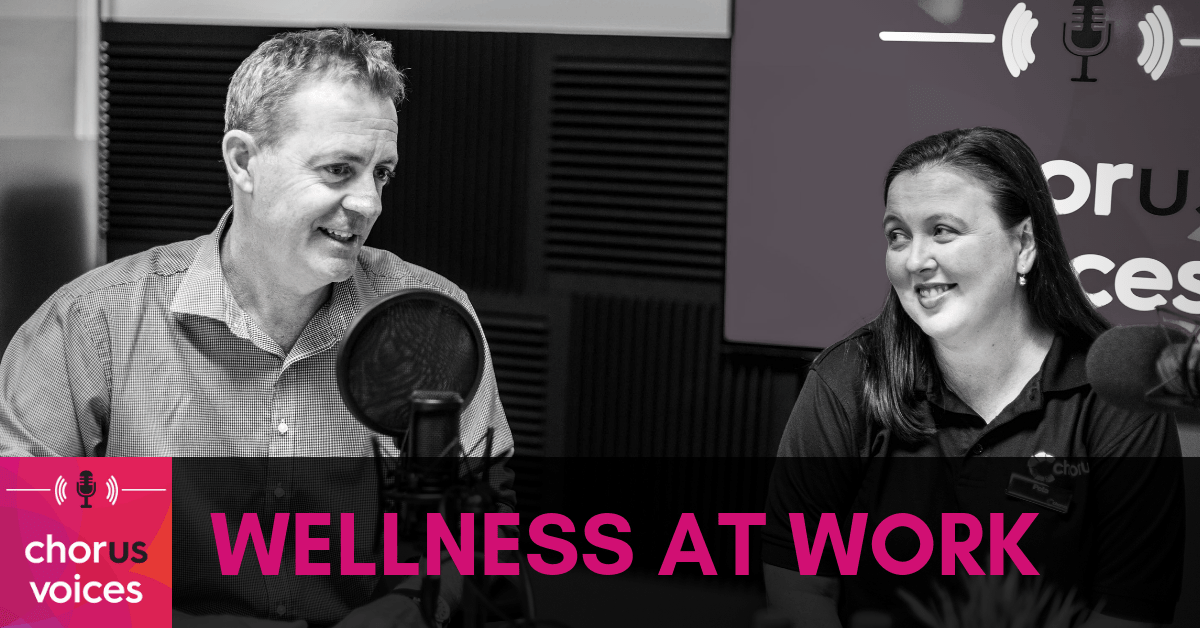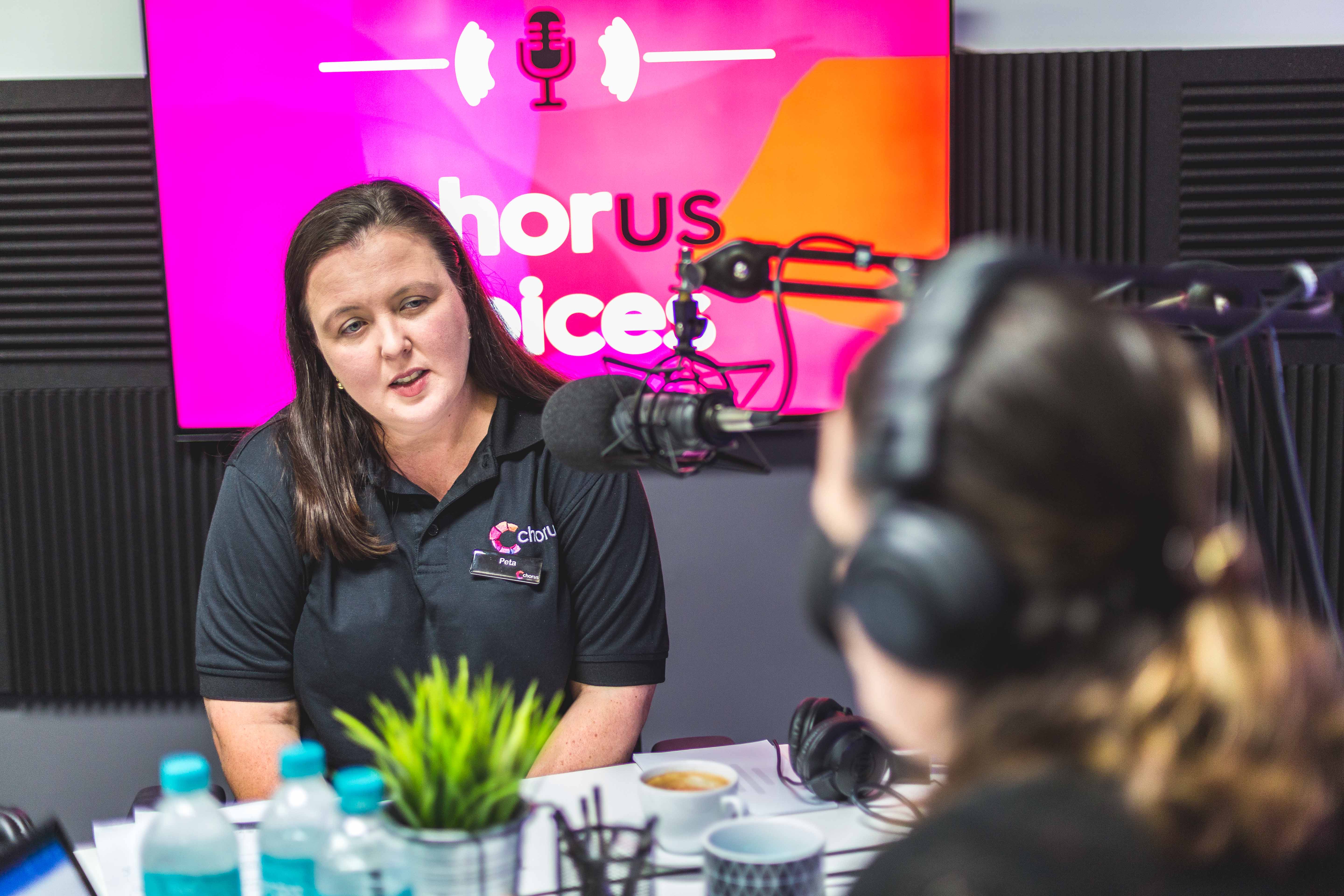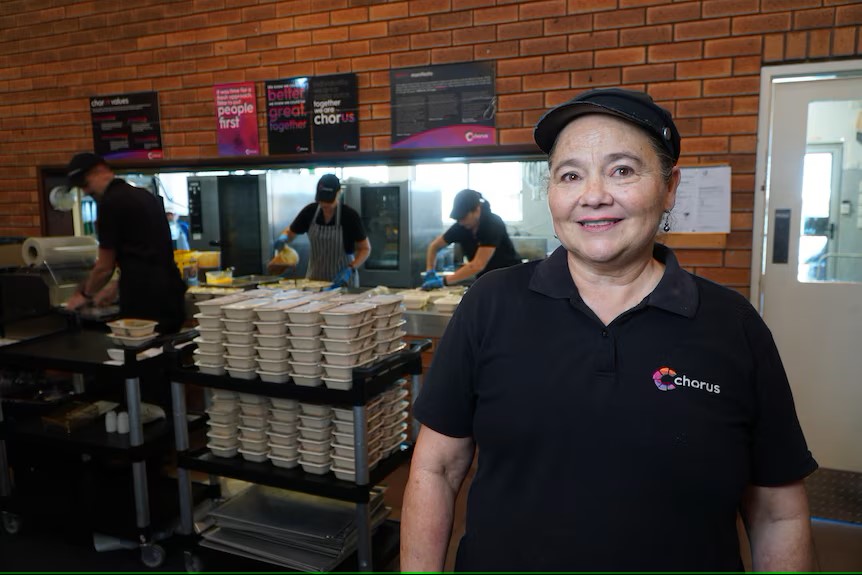
Join Louise Forster and Peta Chaytor from Chorus and Rod West from Access Wellbeing (an employee assistance program) on Chorus Voices, and explore mental health wellness in the workplace. Find out how Chorus provides mental health support for employees, volunteers, and how you can get on top of your mental health and find support in your own workplace.
Listen Now
Or listen on: Apple Podcasts | Soundcloud | LibSyn | Spotify | YouTube
Mental Health Support for Employees [0:00]
This week on Chorus Voices, Louise is in the studio with colleague People and Culture Specialist Peta Chaytor and executive manager of Access Wellbeing Services Rod West.
Louise asks, how do we consider the mental wellbeing of staff and volunteers at Chorus?
“At Chorus, our philosophy is to put people first. We make sure our staff and volunteers feel safe coming to work. Part of feeling safe, is feeling happy and creating a positive environment. It’s okay not to be okay. At Chorus we’re really big on speaking up if we can help you. We tailor approaches for mental health and wellbeing at Chorus. A part of that is offering the Employee Assistance Program through Access Wellbeing,” Peta says.

Caption: Peta in the studio with Louise and Rod.
Louise asks Rod, why should we be thinking about mental health at work and why is it important that we have this approach for staff and volunteers?
“Mental health at work and life in general is critical to our ability to function, and to be the best that we can be. Being able to look after our own mental health is the key to being the best that you can be at work. Mental health at work is critical to your ability to make good decisions and function effectively on a team,” Rod says.
Louise asks Peta, how do we help people see what’s out there, and what we can do?
“We heavily promote the EAP (Employee Assistance Program) with access wellbeing services through brochures and whenever a new staff member begins at Chorus. We display brochures in our staff rooms, kitchens, regular emails, and we promote through Chorus Lines (Chorus staff newsletter) as well. We also have another tool called the mental health response box. Mental health is very individual. Some staff don’t feel comfortable talking about it. They would much rather read about it. They can pick up a booklet from the mental health response box and it gives them guidance on where they can go to seek additional help,” Peta says.
“We provide many staff and volunteers at Chorus with accommodations such as working from home, flexible working practices, and meals on wheels support for those who are mentally or physically ill. We work with the individual to see what support they might need on their recovery journey,” Peta says.
Mental health has not always been included in the concept of safety in the workplace. Now it’s up to the organisation to provide the opportunity for team members to voice their concerns.
 Caption: Louise in the studio.
Caption: Louise in the studio.
Concept of Safety [5:25]
Safety is both the employer and individual’s responsibility. The organisation should provide the opportunity for people to speak up, as well as additional recovery support. However, it’s up to the individual to voice their situation, or psychological state.
Louise asks Rod, how does that impact on the employer and the individual’s safety around mental wellbeing?
“It’s widely acknowledged that workplace safety isn’t just about your physical safety anymore, it’s your emotional and psychological wellbeing as well. It’s not just the employer’s responsibility, buts it’s also the employee’s responsibility. This is all part of the organisation’s policies and procedures. Organisations are realising they have a greater role to employees, not just in regard to their physical wellbeing but also their psychological and emotional well being. Those aspects are coming out in things like leave for family violence, leave for mental health and flexible work arrangements for case by case circumstances,” Rod says.
Mental health support is a sensitive topic in the workplace, especially in regard to family violence cases. Most victims of family violence are afraid or embarrassed to speak up, or to seek advice in public spaces. Providing discreet opportunities is the key to helping employees struggling with family violence.
Family Violence Services [9:00]
The workplace isn’t the typical environment for family violence support. However, it’s extremely important that organisations include support within their mental health assistance programs.
“One in three women will experience domestic violence in some way. Some people define that as physical abuse. What we know about family domestic violence is that it’s not just physical abuse, it includes a whole array of patterns of abusive behaviours, including: financial abuse, sexual abuse, emotional abuse and social isolation. It’s important that we do provide opportunities through promotion strategies where people are able to identify that it might be happening to them. The next step is to determine how they can go about seeking support for that,” Rod says.
 Caption: Rod in the studio speaking about family violence support.
Caption: Rod in the studio speaking about family violence support.
An example of discrete support is a poster on the back of a bathroom door. People can privately read the informational poster and seek support through the correct channels.
How to Support Others with Mental Illness [10:10]
A common struggle people experience is how to approach someone if they think they’re experiencing mental illness. What are the boundaries? How do we manage feelings of guilt if we find out they were experiencing pain?
Louise asks, how can we tell, or support people struggling with mental health issues?
“Often there is no way to tell. The best way is to provide opportunities and spaces for people to feel comfortable to approach a manager, HR department or someone within the organisation. It’s important not to focus on how we didn’t spot it, but it’s more important to ensure people and the organisation promote that they understand that it is an issue in society and not just in the organisation, and that we’re there to provide support. If it does occur, then people must know it’s not their issue to resolve. But they’re there to help and support that person,” Rod says.
 Caption: Rod and Peta in the studio.
Caption: Rod and Peta in the studio.
Tips on How to Look After Your Mental Health [15:00]
Rod shares some of his tips on how to support yourself and how to reach out for support in the workplace.
- “Make a commitment to be aware of your own mental health, and take the time to look after yourself,” Rod says.
- “Find a part of your day to take time out and debrief and reflect on the work you’re doing,” Rod says.
- Reach out and find support.
- Reflect on your strengths.
For employers, it’s important to reflect and report back to team members on all the great work they’re doing. What are their strengths? What are the positives? Provide reassuring feedback that they’re fulfilling the role they were hired to do.
At Chorus we have a supportive culture. Our goal is to look after, and partner with others who who may need some extra support. However, more often than not we forget to look after ourselves. The Employee Assistance Program provides team members with support so that people can continue to partner with others.
If you’re a Chorus team member (staff or volunteer) experiencing mental health concerns, we encourage you to reach out, or speak with the Employee Assistance Program.
Mentioned in This Episode
Connect with Chorus
Credits
Podcast Host: Louise Forster
Opening Voiceover: Ryan Burke
Opening Music: “Wattlebird” by Dylan Hatton Music
Producers: Louise Forster, Matthew Clark
Interviewer: Louise Forster
Special Thanks To:
Rod West, Access Wellbeing Services
Peta Chaytor



